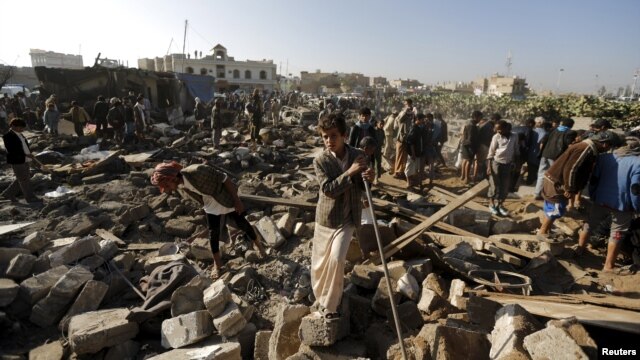Yemeni president in Saudi Arabia amid air strikes
| Publisher | Radio Free Europe/Radio Liberty |
| Publication Date | 26 March 2015 |
| Cite as | Radio Free Europe/Radio Liberty, Yemeni president in Saudi Arabia amid air strikes, 26 March 2015, available at: https://www.refworld.org/docid/552f9da115.html [accessed 30 May 2023] |
| Disclaimer | This is not a UNHCR publication. UNHCR is not responsible for, nor does it necessarily endorse, its content. Any views expressed are solely those of the author or publisher and do not necessarily reflect those of UNHCR, the United Nations or its Member States. |
Last updated (GMT/UTC): 26.03.2015 10:45
By RFE/RL
 People gather at the site of an air strike in a residential area near Sanaa airport on March 26.
People gather at the site of an air strike in a residential area near Sanaa airport on March 26.
Yemeni President Abd-Rabbu Mansour Hadi has reportedly arrived in Saudi Arabia as coalition led by Riyadh launched air strikes against Shi'ite rebels in Yemen.
Saudi state television reported that Hadi arrived on March 26 at a Riyadh air base and was met by the Saudi defense minister.
Hadi, a close U.S. ally, fled Yemen as rebel fighters neared his refuge in the southern city of Aden on March 25.
Saudi jets started targeting Huthi positions overnight in the capital, Sanaa, along with missile batteries and warplanes, killing at least 18 civilians.
Reports said coalition warplanes later bombed targets in the southwestern city of Taez and in the northwestern region of Saada.
The Saudi ambassador to the United States, Adel al-Jubeir, said Operation Storm of Resolve aimed at "defending the legitimate government" in Yemen.
Saudi media said the kingdom deployed 100 fighter jets, 150,000 soldiers, and naval units in the operation.
Saudi-owned Al-Arabiya television reported that several Persian Gulf Arab states, as well as Jordan, Morocco, and Sudan were sending aircraft.
The Iran-backed rebels have made rapid gains in recent months, forcing Hadi to flee Sanaa to Aden.
The rebels now control much of the country's north and several southern provinces.
Defiant rebel leader Abdulmalik al-Huthi slammed the intervention as "unjustified" and called in a televised address for supporters to confront the "criminal oppressive aggression."
Tehran also condemned the air strikes, with President Hassan Rohani saying, "Interference by foreign militaries is very dangerous and deepens the crisis."
The Iraqi Foreign Ministry said the military intervention in Yemen "leads to complicating the situation further."
Lebanon's Iran-backed Hizballah militant group called on Saudi Arabia to "immediately stop the aggression"
The United States and Britain expressed support for the military intervention however, with Washington saying it was providing intelligence and logistical support.
Pakistani Prime Minister Nawaz Sharif promised a "strong response" to any threat to Saudi Arabia's integrity.
Turkish President Tayyip Erdogan told France 24 television that Turkey "may consider providing logistical support based on the evolution of the situation."
"Iran and the terrorist groups must withdraw from Yemen," he added.
The Huthis' advance had raised fears in the predominantly Sunni Saudi Arabia that the Shi'ite minority rebels would seize control of its Sunni-majority neighbor, Yemen, and take it into the orbit of Shi'ite Iran.
Iran denies allegations it is providing money and training to the rebels.
The air strikes triggered oil prices jump nearly 6 percent in Asian trade on March 26 amid fears of massive confrontation in a region that pumps a quarter of the world's 92 billion barrels per day of crude supplies.
With reporting by AP, AFP, Reuters, and dpa
Link to original story on RFE/RL website
